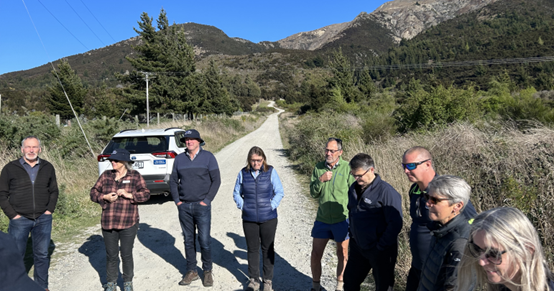She looks forward to finding out the details of what each region will receive.
“Control of wilding pines is important in Otago. Wilding pines cause problems for biodiversity, water yield, fire risk, primary production and landscape value. Great progress has been made, we can’t afford to go backwards,” she says.
“To consider reducing funding at this point couldn’t have come at a worse time for our Otago wilding pines control programme,” she says.

 ORC Councillors and members of the Upper Clutha Wilding Tree Group
ORC Councillors and members of the Upper Clutha Wilding Tree Group
visiting a wilding pine area near Wanaka last week : ORC files
The Ministry for Primary Industries today announced at the Wilding Pine Network Conference that $7M of funding from the Department of Conservation is being added to the National Programme for Wilding Conifers for the current financial year.
There is currently $7.5M in control operations funding; the final-year allocation from Budget 2020, now with an additional, one-off allocation of $7m control operations funding, which comes from the DoC budget.
Around 8.4% of Otago’s land area, 295,830 hectares, is affected by wilding pines. About 70% of Otago is assessed as ‘very highly vulnerable’ to future infestation, making it the most wilding-prone land in the country.
While $10M per year was budgeted nationally for the next decade, Regional Councils have been urging the government to commit to additional funding by a further $15M to a total $25M each year, for each of the next 10 years.

MPI outlined the prioritisation for funding for all regions under the National Programme comes under:
- Most spread prone species
- Vulnerability of surrounding land
- Area/cost ratio
- Additional Considerations
Cr Robertson says “we know that Otago has very highly spread-prone species, NZ’s most vulnerable land to this spread and huge benefits to acting. We’re hopeful for good regional allocation to Otago, we have a strong case for investment”.
Control operations 2023-24
There are 36 Management Units (MUs) where the Programme will deliver operations this year – all are high priority sites for maintenance control to prevent regeneration where control has already started.
The DoC funding will be allocated across 24 of these MUs, mostly in the South Island and also parts of the Central North Island, focused on some key areas where infestations threaten land with high conservation values if not maintained.
This includes areas like the Mackenzie Basin where the land is highly vulnerable to spread, where thirsty wildings reduce ground water for irrigation and hydroelectricity generation, and where the risk of wildfires is high, as we’ve already seen this year.
